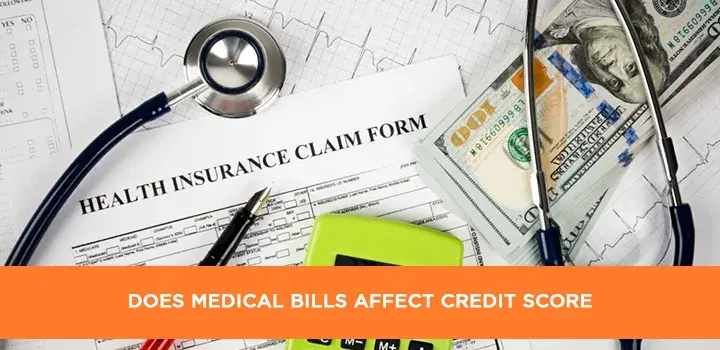-
Posted on: 21 Dec 2022

-
Medical bills incurred after going into collections may not show up on your credit report unless they are sent to the company.
You might think that medical bills in collections will only affect your wallet, but you could also damage or lose credit with lenders. That’s because having an account on record as being owed money means there's some risk associated those aren't exactly things any bank wants to take when issuing new loans!
The good news is that there are many steps you can take to prevent your medical bill from going into collections. The company Consumer Reports found nearly 20% of American credit scores had been negatively impacted by unpaid expenses!
Medical bills are usually sent to collections for several reasons. One, if the person has not made their monthly payment in time and two or more additional payments have been outstanding since then; second If there is an unpaid judgment against them for repayment (even though this shouldn't affect most people who get sued); thirdly -the individual might be avoiding paying because they can’t afford it."
How does a medical bill go to collections?
If you have been ignoring your medical bill, it could be sent to a debt collection agency. There is typically some amount of time given before they take action on unpaid accounts, but this varies from provider to provider and depends largely upon how severe the debt has become over such an extended period without payment.
This means that if we do not pay our debts when promised then these debts may end up reported as disciplinary actions which will stay on credit reports for seven years or more!
How much do medical collection accounts affect my credit?
The impact of unpaid medical collections on your credit score depends largely upon how late you are in paying off the debt. Payment history accounts for 35% of a person's FICO rating, so an account that has been seriously delinquent with payments but is also currently having its tires picked by some collection agency will likely result in damaged good standing with lenders and other creditors who value responsibility over outage times (i.. e., they'll be more inclined not to give us loans).
Unfortunately, there is no one perfect way for credit scoring models to evaluate your finances. Some lenders may use different methods depending on what they believe will best assess how reliable you are as an individual in need of loans or funding from them!
How can I prevent medical bills from appearing on my credit report?
Staying on top of your medical bills can help you avoid the risk of ending up with a big surprise bill in addition to all those other expenses. Make sure that anything unusual or out of -the ordinary is reported properly so it doesn't happen again next time around!
Here’s a list of how and why you should do each of these things to keep medical bills away from your credit report.
1. Familiarize yourself with your healthcare coverage
Knowing what is covered—in addition to your copay-helps, you anticipate and plan for potential costs. Always ask ahead of time how much a procedure may cost if insurance does not cover it or when there's no coverage at all!
2. Negotiate medical bill prices
Negotiation is a great way to find the best prices for your medical treatment. You can negotiate after starting any procedure, but, ideally, you do so before to make sure there are no other options available with cheaper rates than what we're offering!
3. Ask about repayment options
You can negotiate the price of your treatment or procedure and even ask about enrolling in a payment plan if you're unable to pay upfront. It's best for this discussion beforehand, but it may not be possible after the fact so please do communicate with them beforehand!
4. Stay on top of your medical bills
The best way to avoid getting caught by surprise with an unexpected bill is to check your balance after every procedure or visit. Make sure you contact both healthcare providers and insurance companies if they haven’t contacted you about a charge on their end so that no one misses paying what should have been charged in advance!
5. Verify charges right away
After receiving your bill, confirm that the charges listed are correct and covered by insurance.
You should always ask your insurance company and medical provider if there are any charges you don't understand or that seem inaccurate. That way, when it comes time to pay up for treatment in error-you won’t have done so by mistake!
6. Monitor your credit report
Medical debt is a very real concern for many people, and it's something that you should be aware of. Medical providers often have the wrong information on file or may charge patients who are not owed money from their insurance companies; other times bills get lost in the mail before they can even reach your inbox!
If you want to be sure that any inaccurate debts are taken care of, then it's important for your credit report. You can get a free copy from each accessible bureau through AnnualCreditReport.com and see what needs correcting!
How can I remove medical collections from my credit report?
Medical collections can be a huge hassle if you're not careful about how to handle them. If the reported debt is accurate but unfair or inaccurate then it may still go on your credit report as an observation - which will affect any future loans! Make sure that any info obtained from FRO mattering agencies has been verified before making payments accordingly because this could save time in other areas of finances too.
If you find that your credit has been unfairly damaged by an inaccurately reported medical bill, please contact our team. You can learn more about how to correct this issue in the reports, so they are accurate and fair for everyone regarding their future decisions regarding loans or refinancing!
Don't let bad credit hold you back—contact us at (888) 803-7889 now!










